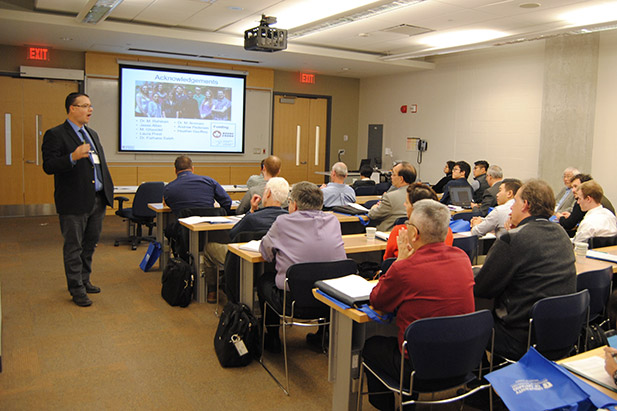Electrochemistry experts convene at university for national symposium
December 13, 2016

More than 75 academics from across the country recently shared ideas about the latest discoveries and advances in electrochemistry at a national symposium hosted by the University of Ontario Institute of Technology (UOIT). The university’s Faculty of Science welcomed members of the Canadian Section of the Electrochemical Society for its Fall Symposium.
With a focus on the interdisciplinary research within the field of electrochemistry, speakers and presenters communicated their cutting-edge research on a wide-range of topics such as (but not limited to):
- batteries
- corrosion science
- electrocatalysis
- electrochemical sensors
- fuel cells
Professor Janine Mauzeroll of McGill University in Montreal, Quebec, delivered the symposium keynote lecture.
Attendees included a leading mix of professors, graduate students, postdoctoral fellows and industrial researchers from coast to coast. Prizes were also presented to the top three student posters.
The conference co-organized by Brad Easton, PhD, Associate Professor, Faculty of Science (Chair) and Mohammadreza Ghavidel, PhD (Vice-Chair), a recent graduate of the university’s Materials Science PhD program.
Quote
“Electrochemical research plays a vital role in Canada’s scientific framework, where discoveries help advance both knowledge and applied technologies. This conference was a tremendous forum for some of Canada’s top electrochemical researchers and industry leaders to exchange ideas and for us to showcase the great facilities we have here at the University of Ontario Institute of Technology.”
-Brad Easton, PhD, Associate Professor (Chemistry), Faculty of Science
About The Electrochemical Society
The Electrochemical Society’s mission is to advance theory and practice at the forefront of electrochemical and solid state science and technology, and allied subjects. To encourage research, discussion, critical assessment and dissemination of knowledge in these fields, the Society holds meetings, publishes scientific papers, fosters training and education of scientists and engineers, and co-operates with other organizations to promote science and technology in the public interest.



